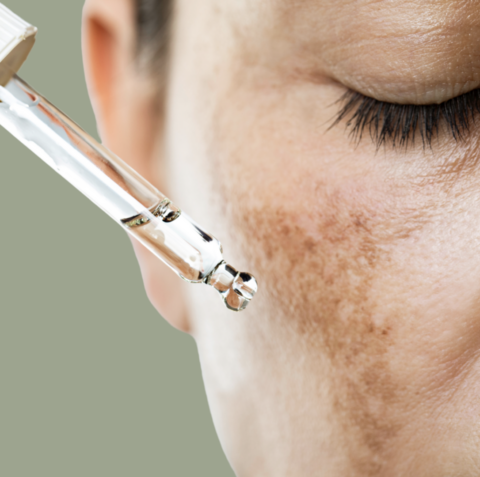Full Body Laser Hair Removal from £108 a month.
Melasma is flat dark patches that appear on the skin with no physical contributing symptoms, only on appearance. It is more common on the face, but can appear on any body part.
Melasma is a common skin condition that can affect both men and women (though usually more common in women). It is a type of skin pigmentation that appears in brown, grey, or freckle-like patches and is usually found on the face including cheeks, nose, above the upper lip and forehead. Though less common, you can also get Melasma on any part of your body including your neck, arms and legs. Find out more about the difference between hyperpigmentation and Melasma.
There is not a specific cause for Melasma though, it is thought that the condition is caused by the overproduction of melanocytes, which causes the pigmentation and results in these dark patches on the skin. This makes it more common in those that have darker skin tones with the additional production of Melanin.
There are also environmental factors that can cause Melasma, so it is important to be aware of protecting your skin. These factors include:

There is no known cure to Melasma but you can help reduce the appearance of it. If you have got it through pregnancy, then there is a high chance that it will reduce or clear in the months after giving birth. It is important to protect yourself from the sun, so wearing sun cream (or products including SPF) every day or shielding exposed areas.
You can also have cosmetic skin treatments including:
The Cosmelan Depigmentation peel is a topical skin whitening treatment that works to reduce pigmentation by acting on the cells that cause it and inhibiting Melanin production for up to 90% reduction.
The Herbal Green Peel also has a similar effect but is a medical-grade treatment powered by natural plants and minerals.
Microneedling helps reduce pigmentation by using tiny needles to puncture the surface of the skin to trigger the body’s healing response. It is a non-surgical treatment that promotes skin rejuvenation.
Other options include iPixel skin resurfacing and CLEARLIFT laser. These treatments use the latest laser technology to send a burst of light into the skin. This intense and targeted light removes the outer layer of the skin and promotes a healing collagen healing response. This helps produce a fresh, smooth layer of skin and therefore reduces pigmentation and leaves the surrounding skin tissue intact.
The Carbon Laser Facial treatment is an effective exfoliation and resurfacing treatment. It uses a blend of carbon powder which is then activated by lasers to stimulate cell rejuvenation. This treatment is gentle on the skin with minimal downtime.
Here at London Premier Laser, we offer a complimentary skin consultation and patch test to ensure we are getting the right treatment course for you. Our expert team uses advanced FDA-approved technology for effective and safe Melasma treatment.
With clinics across London and Surrey, contact us to book your appointment or call us on 020 3871 8218 for further information.
Melasma usually disappears on its own after pregnancy, however, this can take a few months. It is usually caused by a big change in hormone levels, so it can clear up once they are back to normal and the body stops overproducing the cells that cause pigmentation. There is always a chance, however, that it doesn’t go away on its own, so you should consult your doctor or medical professional if you have any concerns.
Yes, there is always a chance that Melasma can appear after pregnancy called the ‘pregnancy mask rather than during, as a result of hormonal changes. If this happens, you should consult a doctor or dermatologist if it doesn’t disappear on its own.
Skin conditions including Melasma are really dependent on the person’s individual skin and how it reacts to treatments. In some people, Melasma will go away on its own without treatment, reduce with treatment, or not respond as well as you would hope. Even if it is reduced with treatment, there is a chance it will come back.
Melasma isn’t a threat to your overall health, as there are no physical symptoms that occur alongside the increase in pigmentation. The NHS therefore, won’t treat conditions that are purely cosmetic, however, can advise and diagnose the condition to ensure it is Melasma.
The hormonal changes that occur in pregnancy and menopause are different, however, the change in hormone balances can also make Melasma a side effect of this. It can go away on its own during or after Menopause, but there is no guarantee.
Our Skin experts are available across 9 clinics to asess your skin needs & goals and create a tailored plan suitable to your needs.
Our Skin experts are available across 10 clinics to asses your skin needs & goals and create a tailored plan suitable to your needs.
Our Skin experts are available across 10 clinics to asses your skin needs & goals and create a tailored plan suitable to your needs.